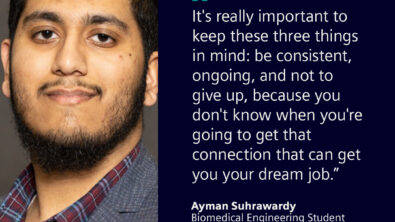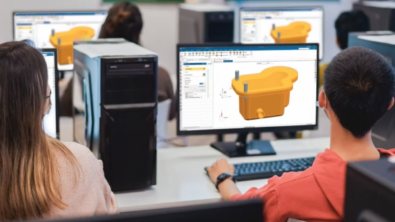You ask! We answer.A podcast from #SiemensMovesSchools

First episode: Hanna Hennig & Cedrik Neike in the interview [English transcript]
What could the school of tomorrow look like? What will be the most important skills needed for the future and why is digitalization so important? These are the questions we discussed with Hanna Hennig, CIO, and Cedrik Neike, member of the Siemens Managing Board, both from Siemens AG, as part of the first episode of the #SiemensbewegtSchule podcast.
But first, what is #SiemensbewegtSchule? In English it means “Siemens moves school” and it was founded by Siemens colleagues last year. It is an initiative that aims to rethink education with schools. Together we want to build bridges, impart knowledge, and promote collaboration according to the motto: just do it.
We asked pupils to send us their questions on the most pressing challenges of our time. We received many exciting questions, among others from the Don Bosco School in Rostock, the Herbert Grillo Comprehensive School in Duisburg, the Ursulinen School in Fritzlar and the Sigmund Schuckert High School in Nuremberg Eibach. We want to discuss these with two of the top bosses of the Siemens Group: Hanna Hennig and Cedrik Neike.
Vanja: Hello Hanna, hello Cedrik. Nice to have you here. Hanna, what do you do as a CIO?
Hanna: Let me explain the abbreviation. CIO stands for Chief Information Officer and this role is responsible for IT in the company. What is IT? IT stands for information technology and means that we, as an IT team, provide our colleagues at Siemens with devices that process data. This can be a laptop, a desktop and of course a smartphone. Furthermore, my team ensures, for example, that we can now all work from home at Siemens, all 290,000 employees.
Vanja: Very exciting, as a CIO you must remember these abbreviations. And Cedrik, what exactly does a board member do and what does Siemens do today?
Cedrik: Yes, board member is a term that was unfamiliar to me as well for a long time. I used to explain to my children that a board member is part of a larger group, responsible for making decisions at Siemens. As a board member, I sit with other board members and we discuss different issues for Siemens, and there is a spokesperson for the board, which is the CEO. In our case, it’s Roland Busch, who is a bit like the class representative, who speaks for all of us and says that we have made this decision, and that’s what we do. That’s how you have to imagine a board member and a board spokesperson.”
What does Siemens do? I’ll start with what Siemens doesn’t do. Your washing machine for example, even if it says Siemens on it- it’s not Siemens, it’s from a company called Bosch. Bosch bought the washing machine from us and has kept the name. We are more concerned with the things “behind the washing machines” and try to make products better. And we do that in three ways: one is with industry. For example, we make sure that your iPhones are built as fast and as well as possible. Secondly with infrastructure: we make sure that renewable energies can be fed into the grid well. And thirdly, in the field of mobility, for example we make sure that if you take the ICE, Siemens train, that it arrives safely.
These are the things we do, and we are a huge organization. Siemens has almost 300,000 employees and I describe it as organization because that’s as many people as there are members at FC Bayern. And there is a Siemens employee in almost every country in the world, which is exciting because we are very diverse.
Vanja: Yes, that’s really quite a lot. Thank you very much for the introductions. We now come to our first topic, personal career development. And when I think about my own school days, the topic of grades was always important. At least it always played a big role. Grades were often simply associated with later career success and this is also what our first listener from the Ursuline School in Fritzlar is concerned about.
Joel: Hey everyone, my name is Joel. I wanted to ask if you think that a good grade in your degree will be important for your career in the future or if that will change in the future.
Vanja: Hanna, what do you think?
Hanna: Well, I think that good grades are important in one way or another. On the other hand, we as a company are not only interested in grades, but also with personality. And personality is not formed by grades, but by whether and how one is involved. For example, in voluntary work, in the technical relief organization or the fire brigade, or helping in animal shelters. Doing internships alongside school and studies, and that showing curiosity and willingness to learn. These are all qualities that you don’t really learn at school.
What is much more important to us, for example, is how to work together in a team, how to achieve results together and not just in one individual way. I believe that it is important, especially in today’s fast-moving world where a lot is changing and where we can absorb a lot of knowledge, that we work in networks, that we work in teams, and that we successfully achieve results together.
In this respect, I can say that it must be a good balance. Personally, I don’t have an A-level, but I still think I’ve achieved a lot in my life. I’ve always put myself in situations that I couldn’t necessarily predict, I’ve always tried to go out of my comfort zone. For example, I went abroad on a local contract in the US. I didn’t get a shipping contract from my home country but started from the beginning in the US without any support, and that also shaped me. Now I’m willing to take a lot more risks because I’ve realized that I can do it without a secure network. I think good grades are important, but you should try out other things besides school and studies.
Vanja: Thank you so much for this very exciting and personal insight. I would simply say that the path is the goal, and the school plays a decisive role in helping to shape this path. But how exactly? Our next question comes from a teacher from Rostock.
Claudia: Hello, I am Claudia König, teacher at the Don Bosco School and I teach the economics course. I would like to know what skills and competences school should teach the students. In particular, the economics lessons: What must be emphasized?
Vanja: Yes, very good question. Cedrik, how do you see it?
Cedrik: For me, school has always had three tasks. The first task: learning to learn. Now that sounds weird. People always think: It’s over after school. But quite the opposite! Hanna and I learn something new all the time. We are always open to learning because things change quickly and that’s what makes it so exciting. So, the most important thing is learning to learn.
The second thing is: learning to get along with each other. School is a wonderful environment where we constantly compromise with each other. How to get along, how to improve getting along. We learn that more at school than anywhere else.
The third thing, pupils learn in economics classes. For example, what is the supply? What is the demand? How are they brought together? That will accompany you throughout your life. The new business models are also important. How can we do business in the future? For me, it was quite different: I was given one of the computers in IT-class about 30 years ago, the Commodore 64. I loved playing games on it. At that time there was no Zelda, no Sims and no Candy Crush. That’s why I programmed my own computer games. And that was extremely useful for me later, because I not only learned how to learn, but also how to deal with others. I acquired certain skills and certain abilities. I think that’s something you can also take with you in business lessons.
Vanja: That’s right. I agree with that. Whenever it comes to learning skills, motivation is also an issue and the keyword motivation brings us to our next question. Let’s listen.
Nicolas: Hello, my name is Nicolas Juck. I study at the Don Bosco School in Rostock, in the 11th grade of high school. I attend the basic economics course there and I asked myself the question: How do you ensure that your trainees remain motivated?
Vanja: I would like to address the question to both of you. What would you advise? Cedrik, do you want to start?
Cedrik: The most important thing is that you must be motivated on your own, of course. I would like to share my personal experience. I did my commercial apprenticeship at Siemens when I was 18 and it was great. You should know that I have dyslexia. I don’t think I’ve ever taken a spelling test in my life where I didn’t get the worst grade. I was always told: You can’t do it. At that time, it was a question of whether I would get into Gymnasium, the good high school in Germany. My parents got involved and I got into Gymnasium. At that time, the headmaster told me that I wouldn’t make the Abitur (final exams). But I managed to do it because I really wanted to. That’s how I ended up as a trainee. I really wanted to learn something practical, and it was important for me to take that with me before I go to university. In other words, my motivation was driven by me.
Of course, we try to give the trainees the opportunity to develop themselves. But in the end, it is you yourself, who is on the hook for motivation. You must want to do it and also use what a company like Siemens makes available.
Vanja: Yes, very motivating. Thank you very much, Cedrik. Hanna, what else would you add?
Hanna: I think that it also depends on the company. The meaning and purpose we convey should be a big motivation. I hope that everyone who applies to Siemens also sees what products we provide to improve society. We also provide resources so that products are created or produced with less effort and less material. I assume that Siemens can really make a big contribution with the products and that also motivates. As head of IT (CIO), I hope that we provide enough digital resources for our trainees. Then, they are hopefully also fascinated by the fact that they find a modern working environment at Siemens. For example, they get a MacBook or an iPhone. So, it’s fun to work for us because we provide all the digital tools that are also used in private life. I can also confirm that our training programs are very, very interesting. Our training programs offer a diverse spectrum, from the technical to the business environment. There will soon be a podcast about this from our colleagues in the HR department. I definitely recommend listening to it, especially if you are interested in the topic of training at Siemens.
Vanja: At the end we will give you a few tips and tricks on the topic of training in Siemens. We then come to our next topic: a very current topic because companies and researchers around the world are trying to find a solution to the energy problem. One of these solutions is electric cars, or e-cars for short. This is because they do not emit exhaust gasses but run with electricity. This makes electric cars very climate friendly. They are often called the cars of the future. Siemens is not a car manufacturer, but many technologies produced by Siemens are installed in vehicles. Cedrik, what exactly are these technologies? How much of Siemens is in a Mercedes Benz, for example?
Cedrik: We do two things: the first thing is the controlling. Imagine that all the machines in the world have a brain. For every machine, every third “brain” comes from Siemens – – for example, the motion planning of a robot arm, comes from Siemens. That means that in car production there are many machines that have a “Siemens brain”, and they make sure that the cars are put together properly.
Furthermore, what many people don’t know is that Siemens is one of the ten largest software companies in the world, like the “Microsoft of industry”. And what do we do exactly? In the past, cars were prefabricated from wood or clay, then they were driven against the wall for testing. Today, like in a computer game, we build an avatar or a so-called “twin”. We build a twin of the car and then test it. We test every circuit. What does it look like when the car goes through a wind tunnel? What happens when it rains? Can you drive through a puddle? How long does a battery last? We simulate that, like in a computer game, before the first screw, the first metal part is even picked up. At Siemens, we help engineers to implement and realize their ideas. That means that when you get into a Mercedes or an electric car, there’s an incredible amount of “Siemens brain power” in there that comes from the software area or from our automation and control technology.
Vanja: Super exciting! Just the comparison “we are the Microsoft of industry” brings me to our last question for today. The last question refers to the future Siemens business.
Oli: Hello, this is Oli, 12 years old. Siemens also has a software business. I wanted to ask if Siemens will also design computer games in the future.
Cedrik: The good thing is that you will be the adults of tomorrow. I used to program computer games myself, whether it was Zelda or whatever. I’ve taken that into this generation and those computer game skills that you have will be used more and more, because the factories of the future will work like a computer game. We also use technologies that are like the first-person shooter environment to visualize that. That is, a virtual factory is built first. Then it is run through virtually and observations take place: What does it look like when there is a fire? When and where do you have to run away? Many of these ideas that come from the computer game industry are also used by us to plan things in advance. To come back to the question: Are we going to sell computer games for the next Nintendo or Sony? I don’t think so. But most likely you will be able to program in the real world and you can have a really big impact on it, e.g., reduce energy or develop better electric cars.
Vanja: Thank you very much, Cedrik! Hanna, as an IT expert, do you have some final tips and tricks on computer game programming?
Hanna: If you enjoy it, Siemens is definitely a good option. Firstly, we sell the software that can be used for this, our so-called low-code Mendix software. You don’t have to be an IT specialist, but can learn it yourself and build your own little app.
The second thing is we also use playful principles, we call it gamification, at Siemens. For example, we build apps in which we motivate employees to travel in a more CO2-neutral way, e.g., to travel less. Prizes are then offered for this. We may then use games to integrate gamification aspects in other areas of Siemens.
Finally, if someone is interested in using low-code Mendix, you can learn it from us or at a hacker school. There you can learn to program games or other things. If you have fun with it, then you can apply to me.
Vanja: Very good. That was a great conclusion. Thank you very much, dear Hanna and Cedrik, for being here today. These were insightful answers to very exciting questions. Many thanks to the pupils, students, and teachers for sending in their contributions. If you would like to find out more about training opportunities at Siemens, please look at our website: www.ausbildung.siemens.com. Here you will find further information about our currently available applicable options. On the website, you can also register for our virtual job fair SIEYA and learn more about apprenticeships or dual study opportunities. Every Thursday from 3 p.m. to 5 p.m., you can chat with our experts and ask your questions.
That was: You ask, we answer – a podcast from #SiemensbewegtSchule. Stay tuned for the next episode! Until then, have a great time.
If you want to listen to the original podcast in German you can find the first episode on Soundcloud, Spotify, Apple Podcasts, Acast and on the Siemens Podcast Network.
If you have questions on the initiative #SiemensMovesSchools drop us a note under siemensbewegtschule.de@siemens.com.


